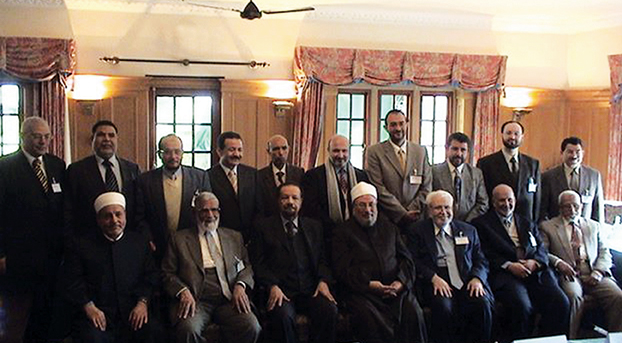About the Maqasid Centre
- Background
- The Maqasid Centre’s Mission
- The Maqasid Centre’s Founding Council
- The Maqasid Centre’s Aims and Objectives
- The Maqasid Centre’s Advisory Board

Maqāṣid al-Sharīʿah (Philosophy of Islamic Jurisprudence)
The civilisation of Islam is distinguished by several features. One of these is the fact that it covers many fields, including a flexible and sophisticated Sharīʿah which is based on justice and the public interest. It establishes the ideals of freedom, equality and mutual consultation. It extends widely to encompass sciences such as medicine, pharmacy, agriculture, chemistry, astronomy, mathematics and architecture. Compared to the Roman civilisation, for example, known for its historic law and architecture whose presence is fading, or the Greek civilisation, known for philosophy and medicine, and many other similar cultures and civilisations, the Islamic civilisation reflects an approach to human life that seeks to ensure healthy progress in all its aspects.
The study of the philosophy of Islamic law, especially its maqāṣid (objectives, purposes, goals, intents and underlying principles) is a pre-requisite to understanding the Qurʾān and the prophetic tradition, and to developing the Islamic law in a way that achieves common good for Muslims and protects them from harm.
The development of new Islamic rulings (ijtihad), which should always be practised by scholars, depends primarily on a comprehensive understanding of maqāṣid of the Islamic law and its prioritisation in practise. The correctness of rulings that are reached through ijtihad depends on the correctness of this understanding. Hence, ijtihad is in real need of maqāṣid, in order to achieve the objectives for which Prophet Muḥammad (peace and praise be upon him) was sent.
For that purpose, Al-Furqān Islamic Heritage Foundation established the Centre for the Study of the Philosophy of Islamic Law (the Maqasid Centre).
The Maqasid Centre’s Mission
The Maqasid Centre's mission is to revitalise the knowledge of maqāṣid, in order to develop the process of ijtihād and the renewal of Islamic fiq’h, its fundamental theory (uṣūl), and Islamic thought in general. The Centre also aims to broaden the horizons of knowledge for students of Islamic studies everywhere.
The Maqasid Centre’s Founding Council
The Founding Council of the Maqasid Centre was a body of outstanding academics and scholars in different fields of Islamic studies. They gathered in London, in March 2005, with the aim to:
- Establish an overall strategy and guidelines.
- Define the Maqasid Centre’s fields of activities.
The Maqasid Centre’s Founding Council consisted of the following members:
- HE Sheikh Ahmad Zaki Yamani, Chairman
- Dr Abdul Adheem al-Deeb
- Dr Abdul Rahman al-Kelani
- Dr Ahmad Yusuf Sulaiman
- Dr Hasan Jaber
- Dr Ibrahim al-Bayoumi Ghanem
- Dr Jamaluddin Atiyyah
- Dr Jasser Audah
- Dr Mahmoud Bilal Mahran
- Dr Muhammad Attahir al-Misawi
- Dr Muhammad Haytham al-Khayat
- Dr Muhammad Kamaleddin Emam
- Dr Muhammad Salim al-Awa
- Dr Noureddin al-Khadimi
- Dr Saifuddin Abd al-Fattah
- Dr Wahbah al-Zuhaily
- Dr Yusuf al-Qaradawi

The Maqasid Centre’s Aims and Objectives
The Maqasid Centre’s main aims and objectives are:
- Encouraging studies and research which contribute to the Islamic philosophy of law, inside and outside the academic world.
- Giving special consideration to new research in the theories of priorities, utility, consequences and universal principles of Islamic law.
- Reinforcing the link between the study of maqāṣid and the study of the basic rules of the Islamic law.
- Calling upon scholars to elaborate on the correlation between contemporary ijtihād and maqāṣid, so as to facilitate understanding the wisdom and the objectives of Islamic rulings.
- Calling upon scholars and Islamic institutes of fatwa to illustrate the link between the Islamic texts, fatwā and maqāṣid.
- Refuting attempts to misuse the idea of maqāṣid in order to “deconstruct” the Islamic principles and fundamentals.
- Promoting and publishing biographies of scholars who have contributed to the study of maqāṣid.
- Co-operating with Islamic universities and Islamic studies departments in order to include the maqāṣid in their curricula or syllabi.
- Incorporating maqāṣid theories in the methodology and philosophy of various social sciences and humanities.
- Establishing a comprehensive maqāṣid encyclopaedia.
To achieve its aims and objectives, the Centre pursues the following activities:
- Publishing new critical editions of maqāṣid books of particular significance.
- Publishing bibliographical references in the field of maqāṣid.
- Publishing studies on the objectives (maqāṣid) of Islamic law.
- Organising training courses on understanding the maqāṣid.
- Holding conferences, symposia, seminars and lectures to stimulate research and discussions on topics related to the field of maqāṣid.
- Establishing a reference library with the main research tools necessary for the study of maqāṣid (philosophy of Islamic jurisprudence).
- Encouraging Islamic studies departments and programmes outside traditional Islamic institutes, to conduct research that shows the universality of Islamic law in all cultural contexts.
- Encouraging versatile students and young researchers to study the philosophy of Islamic law, the maqāṣid.
The Maqasid Centre’s Advisory Board
The Advisory Board of the Maqasid Centre includes a distinguished group of scholars and researchers in different fields of Islamic studies.
The Advisory Board is an advisory body, with a role to:
- Review the activities of the Maqasid Centre and provide the appropriate directions
- Elaborate on, and discuss themes for projects to be adopted by the Centre.
- Inspect projects and scholarly works submitted to the Centre, and issuing decisions as to its acceptance, request for modifications, or rejection.
The Maqasid Centre’s Advisory Board members are:
- Dr Ahmad al-Raisouni
- Dr Hasan Jaber
- Dr Ibrahim al-Bayoumi Ghanem
- Dr Issam al-Basheer
- Dr Mohammed Salim al-Awa
- Dr Noureddin al-Khadimi
- Dr Saif al-Din Abdu-l-Fattah

